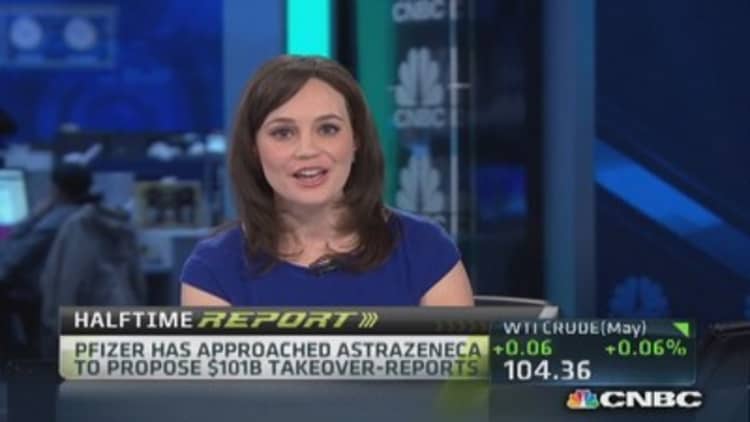
Yes, it would be among the biggest pharma deals of all time. Yes, it's $101 billion—more than half of Pfizer's market cap. And yes, the target is a company with projected revenue declines of 7.6 percent in the next five years due to patent expirations.
But analysts say Pfizer's reported $101 billion bid for AstraZeneca makes some sense. And that's despite the fact that reports from the Sunday Times of London and Bloomberg News both say the talks may have taken place as long as a few months ago, and have since fizzled—an important point.
However, if Pfizer did approach the London drugmaker, it may mean the company is not opposed to executing its fourth megamerger—with AstraZeneca or another company.
The reasons:
- Pfizer's got an estimated $70 billion in cash, much of which is parked overseas. An acquisition of London-based AstraZeneca would put that cash to work without bringing it back to the U.S., avoiding a gigantic tax bill for Pfizer.
- The opportunity to lower its corporate tax rate. SunTrust analyst John Boris points out Pfizer pays the highest tax rate—28 percent in 2013—of all of its peers.That compares to 17 percent to 18 percent for Bristol-Myers Squibb and about 20 percent for AstraZeneca, he said. Reincorporating in lower-taxed locales, like Ireland, has been a hot trend among drug companies in the last few years (see: Actavis/Warner-Chilcott and Perrigo/Elan), and Pfizer could be seeking a similar path.
- Cancer drugs. AstraZeneca's got a pipeline of experimental medicines in a field called immuno-oncology, which aims to harness the immune system to fight cancer, one of the most important fields of cancer drug development.
"The pharmacologic ability to up or down regulate the immune system to control cancer (immunotherapy) or control auto-immune diseases will drive industry returns over the next decade," Citi analyst Andrew Baum wrote in a research note Monday. "AstraZeneca's long legacy as an oncology leader would materially aid/accelerate Pfizer's evolution into an oncology company."
Read More
When New York-based Pfizer reports earnings May 5, it will the first time it provides separate statements for its three recently established business units, one of which focuses on vaccines, oncology and consumer products. Some analysts have speculated this delineation could be in preparation for a breakup of the company in a few years, a thesis that some questioned in the event of a megamerger like this one.
Mark Schoenebaum, an analyst with ISI Group, doesn't think a big acquisition blows up those prospects.
"Growing bigger (and, in Pfizer's view, better) doesn't at all mean Pfizer can't split up," Schoenebaum wrote in a note to clients Monday. He points out a split wouldn't come for a few years, giving Pfizer time to integrate an acquisition.
Perhaps the biggest opposition to a potential deal comes in the frame of history. Pfizer did three gigantic pharma deals over the last 15 years, spending a total of $218 billion among them: Warner-Lambert, which brought the top-selling Lipitor, in 2000 for $90 billion; Pharmacia in 2003 for $60 billion; and Wyeth in 2009 for $68 billion.
Read MoreWhat to watch for in biotech earnings
The amount Pfizer has spent on those three acquisitions alone exceeds its current market cap by 10 percent. Some argue that's a reflection that such big deals don't add value.
"The Pharmacia and Wyeth transactions did not create value for shareholders," SunTrust's Boris said Monday in a telephone interview. He uses as a metric the value of the company two years after the transaction, gauging success by whether it's increased. "The only transaction where that was the case was in Warner-Lambert," he said.
Boris's pick for Pfizer, if it wants to make a play in immuno-oncology, is Bristol-Myers. The company's shares rose 2.1 percent Monday to $50.51 on speculation it could be another target for Pfizer.
Read MoreSarepta shares up 58%; FDA to review its drug
Though the talks between Pfizer and AstraZeneca are reportedly a thing of the past, Schoenebaum points out we may get some clarity this week on whether an approach was indeed made.
"Due to the intricacies of U.K. takeover law, it's quite possible (though not absolutely assured) that we get an official announcement tomorrow (Tuesday) from AstraZeneca as to whether or not Pfizer (or other parties) have actually approached them," Schoenebaum wrote in a note to clients. He explains that a deal "leak" that moves the stock more than 5 percent intraday could require the target to identify bidders.
AstraZeneca shares closed Monday up 8.8 percent at $69.10; Pfizer's shares added to 2 percent to close at $30.86. Stay tuned.

